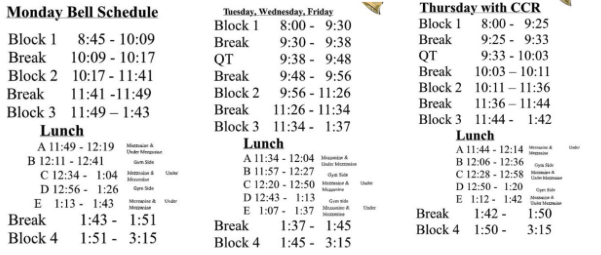Shifting schedule
Why blocking is the best
These are the current schedules, and there are a lot. It may be best to simplify it down to just two, as it can confuse many people.
December 17, 2021
A subject of recent debate around the student body and the administration has been the future of the 4×4 block schedule. Many students, including myself, like the schedule, as it provides flexibility in your later years of high school, but also longer class periods to get done with more work. In a small poll done by myself, there was overwhelming support for block scheduling. It also provides a special opportunity to graduate early, allowing students to get a jumpstart on adult life.
While a change in the schedule is just speculation, it is important that the student body gets some sort of say in how the next few years of their life will be in the future, as it would most likely come into effect in 2023-24 year. We need to keep the block schedule.
While we may never know what led to the debate on the schedule, some rumors are that a parent-led group may be the cause, as it seems like the majority of changes in school have stemmed from — and they do have a point to make. The classes are long, and feel like they can drag sometimes, even in the best scenarios. But that’s the way they are meant to be. The long classes allow less homework, if used properly, and could even enhance learning by making sure the students are fully understanding the material. For example, math class is based on repetition. Say a student is struggling with a certain concept like quadratic equations. If used properly, the class could learn the concept, but those still struggling can get extra help without having to stay after class. It also would reduce the chances of the concept being done wrong.
If that students don’t have the chance to explore other subjects and electives if they are in a music class. Only four periods to learn is a major drawback for those still trying to figure out if they want to post secondary education. The solution is simple: summer school. For many that try and graduate early, it’s the best loophole. Simply knock out your required classes over summer, and take your electives over the school year and you get the best of both worlds.
Millard West is a school that prides itself on academics, athletics, forensics and equality, as displayed on the school crest. With the block schedule, all four of these can be achieved. According to GreatSchools.org, West has an above average rating for academics (West has an eight, Millard North has a seven and Millard South has a four). This can be in direct relation to the block scheduling, as it has been a staple at the school since the grand opening. If it isn’t broken don’t fix it. As for athletics, well the resume speaks for itself. Volleyball placed 2nd in state this year, football has historically been one of the most consistent teams, men’s basketball made it to the semi finals last year, Cross Country had one of its best seasons this year, and baseball placed second in state last year. There is no doubt that the reduced amount of stress from block scheduling helps on the field, court, and track.
The underlying point is this: don’t change a thing. A change is inevitable, but do listen to the ones that you are directly impacting, as it seems like the student body is losing its voice every single day, across the nation.







